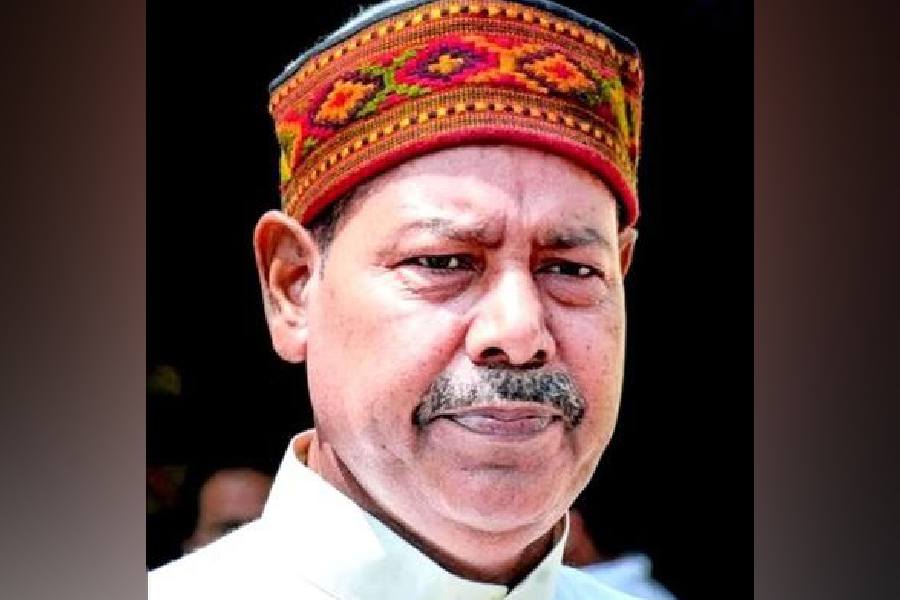 |
| Palestinian men crawl under the rubble of a house looking for survivors after it was hit by an Israeli air strike in Gaza City on Monday. (AFP) |
Jerusalem, Aug. 4: Minutes after Israel began a unilateral and partial ceasefire in Gaza today, the air force struck a house in the Shati refugee camp in Gaza City, killing a girl, 8, and wounding at least 29 others.
More than six hours later, there was still no official comment about the strike from the Israeli military, which continued to withdraw many of its ground forces from populated areas in Gaza, about why it struck the house.
After sharp criticism from the US and the UN of its strike outside a UN school yesterday, which killed seven persons in addition to its intended targets, three Islamic Jihad fighters on a motorcycle, Israel announced a unilateral cease-fire to last from 10am until 5pm (local time), Israel said the ceasefire was intended to assist humanitarian relief efforts.
But the ceasefire was to take place only in areas where Israel was not engaged in military activity. Israeli Army officials said that east Rafah, in southern Gaza, far from Gaza City itself, was the only urban area where troops and tanks were engaged in fighting today, with the rest of the Israeli troops pulled back closer to the border with Israel and some redeployed in staging areas inside Israel itself.
Gen. Motti Almoz, the chief military spokesman, told Army Radio that “redeployment lets us work on the tunnels, provides defence and lets the forces set up for further activity”.
“There is no ending here, perhaps an interim phase,” he said.
Sami Abu Zuhri, a spokesman for Hamas, the dominant faction in Gaza, said it would not observe the truce, which he disparaged as a media exercise, and he warned residents to exercise caution when they ventured outside. “The unilateral cease-fire announced by Israel is an attempt to divert attention from Israeli massacres,” he said. Earlier today, Israel bombed the house of an Islamic Jihad commander in northern Gaza, Danyal Mansour, killing him.
Ashraf al-Qedra, a spokesman for the health ministry in Gaza, said that the strike on the house in Shati took place several minutes after the announced start of the ceasefire, but one Israeli official from the army agency that controls coordination with Gaza told Israel Radio that the strike took place just before the ceasefire began.
The ceasefire, coupled with the redeployment, was another indication of Israel’s decision for now to reject further negotiations on a cease-fire with Hamas or with President Mahmoud Abbas of the Palestinian Authority, and instead to make unilateral decisions.
After a string of broken ceasefires, the Israeli intention, officials explained, was not to reward Hamas and allies like Islamic Jihad through negotiated concessions, but to wait and see whether the armed groups in Gaza, badly damaged by this conflict, will stop attacking Israel.
The last major Israeli war in Gaza ended after three weeks with a unilateral Israeli ceasefire in January 2009, which took hold after a few days. A briefer conflict, in November 2012, ended with negotiations carried out by the Egyptian President at the time, Mohamed Mursi of the Muslim Brotherhood, who saw Hamas as an ally.
But the deal arranged then to ease restrictions on Gaza in return for “quiet” did not last, and Israel does not trust Hamas to implement any negotiated arrangement.
At the same time, Israeli officials argue, Egypt’s new President, Abdel Fattah el-Sisi, the military man who ousted Mursi, sees the Muslim Brotherhood and Hamas as a threat to Egypt, a position of antagonism to Hamas even sharper than Egypt’s position under Hosni Mubarak during his three decades in power.
Egypt now, having largely halted the tunnel trade in smuggled goods and arms that flourished under both Mubarak and Mursi, will make it much harder for Hamas and its allies to re-supply themselves with weaponry and building materials for new tunnels.
At the same time, with its control of the Rafah crossing, Egypt has great leverage over Gaza, and one idea is to try to empower Abbas and the Palestinian Authority, which is still dominated by the Fatah faction, to take responsibility with Egypt over the crossing.











